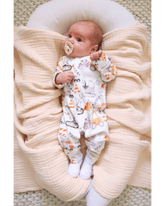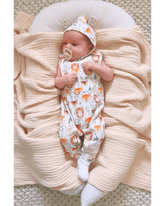The Impact of Music on Your Baby’s Development
As parents, we all want to give our babies the best start in life. One of the simplest yet most powerful tools for their development is music. From the soothing sounds of lullabies to the playful tunes of baby songs, music plays an essential role in your baby’s growth, helping with everything from language development to emotional regulation. Let’s explore the incredible impact that music has on your baby’s development.
1. Music Stimulates Brain Development
Research shows that early exposure to music helps shape your baby’s brain development. Music is a form of auditory stimulation, and your baby’s brain is constantly growing and making new connections in their first year of life. Studies have shown that babies who are exposed to music tend to have improved cognitive abilities, such as memory, problem-solving skills, and attention span, as they grow.
The rhythm, melody, and structure of music engage multiple parts of the brain, helping to build stronger neural connections that can benefit your baby long after their early years. So, playing music around your baby, even from the first few months, can be incredibly beneficial.
2. Lullabies Help Baby Feel Secure
Lullabies are not just beautiful songs—they provide comfort and reassurance to your baby. The familiar melodies and soothing rhythms help create a sense of security, which can be particularly calming during times of stress or discomfort. The repetition of a lullaby also strengthens the parent-baby bond, as it’s something you can share together.
Music can signal to your baby that it’s time to wind down, making bedtime routines smoother and more peaceful. You’ll find that using a calming lullaby can help ease your baby into a restful sleep, which is vital for their growth and well-being.
3. Music and Language Development
Your baby’s language skills are nurtured from an early age through the sounds they hear. Even before they can speak, babies begin to distinguish between different sounds, tones, and rhythms. Singing to your baby, talking to them in a sing-song voice, or playing music with distinct melodies can help develop their auditory discrimination skills.
As babies grow, they start to recognize familiar songs and sounds. Singing and repeating words, whether in a lullaby or playful tune, helps them build a foundation for their own speech development. The rhythm and repetition in music also improve babies’ understanding of language patterns, which later aids in their ability to communicate.
4. Music Encourages Emotional Development
Music is one of the most powerful ways to engage your baby emotionally. The different tempos and melodies in music can express various feelings, helping your baby begin to understand and process emotions. A gentle lullaby may soothe a fussy baby, while a bouncy, upbeat tune can lift their mood and create feelings of joy and excitement.
As babies begin to experience a wider range of emotions, they learn to connect those emotions to the sounds they hear. This helps them develop emotional regulation and empathy as they grow older. Plus, singing along with your baby strengthens the emotional bond between you, making them feel loved and safe.
5. Music Supports Physical Development
While babies are primarily focused on developing their sensory and cognitive skills, music also encourages physical development. As your baby grows, they may respond to the music by moving their arms, legs, or head to the rhythm. This is an early form of motor coordination and can be a fun way to encourage movement and exercise.
Interactive music experiences—such as clapping along, gentle rocking, or dancing—can also help your baby build coordination, balance, and strength. As they start to grow and gain more control over their movements, music can be an engaging way to get them moving and developing motor skills.
6. Tips for Introducing Music to Your Baby
-
Sing to them: Whether it’s a simple song or a familiar lullaby, singing to your baby is a wonderful way to engage them in music. Your voice is soothing and comforting, and the rhythm helps develop their sense of hearing.
-
Play gentle music during downtime: Soft, calming music can help your baby wind down before naps or bedtime. Classical music or nature sounds are great choices.
-
Engage with rhythm: Gently clapping or tapping along to music will encourage your baby to start associating rhythm with movement.
-
Interactive music play: As your baby gets older, you can introduce toys that make music or encourage them to play with instruments like tambourines or maracas. This can be a fun way to stimulate their sense of creativity.
Music isn’t just a nice background for your baby’s day—it’s an essential tool for their development. From helping with brain growth to encouraging emotional and physical milestones, music has a profound impact on your little one’s journey. So, play that lullaby, sing your favourite tunes, and enjoy the beautiful bond that music creates between you and your baby.














